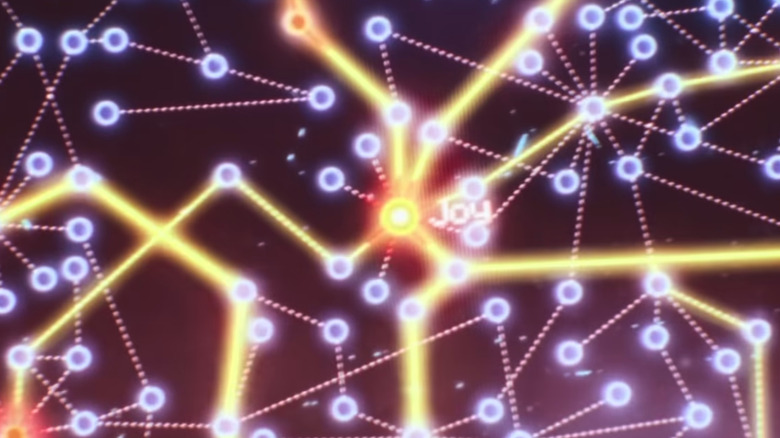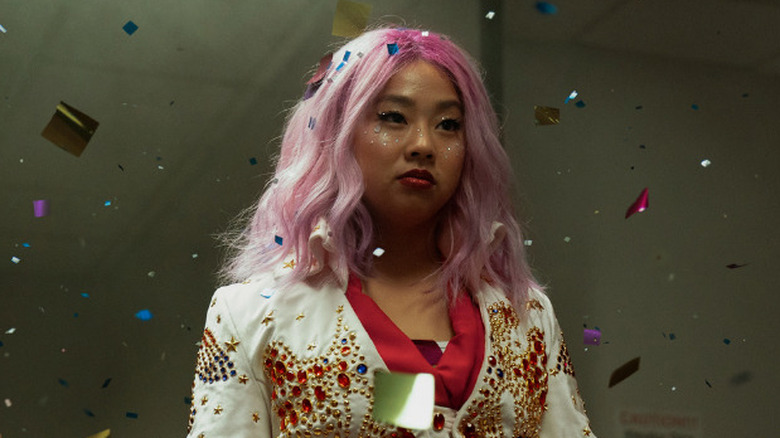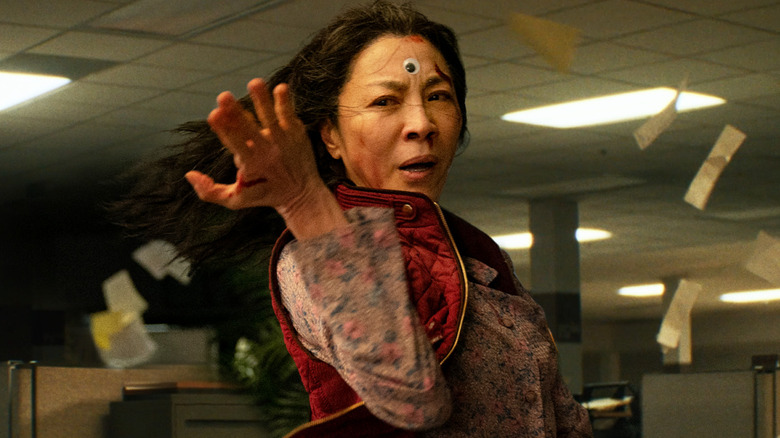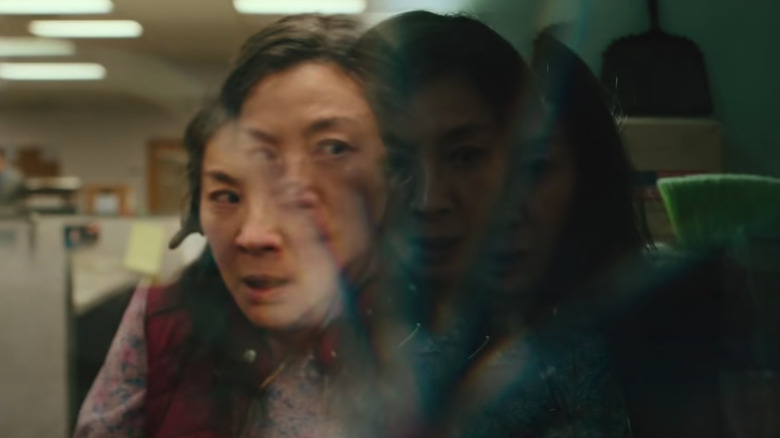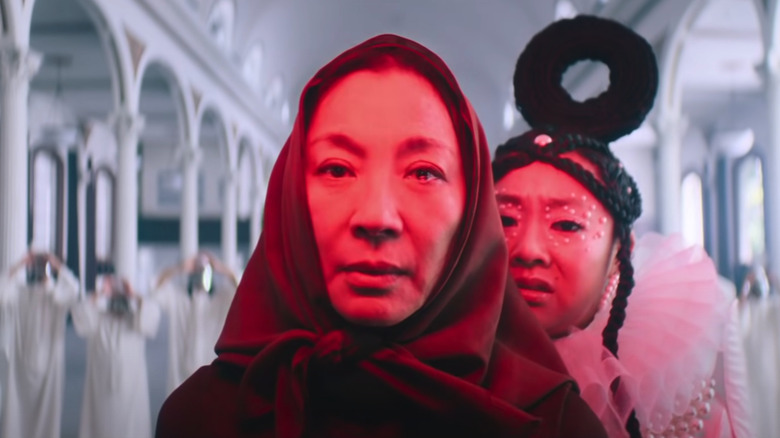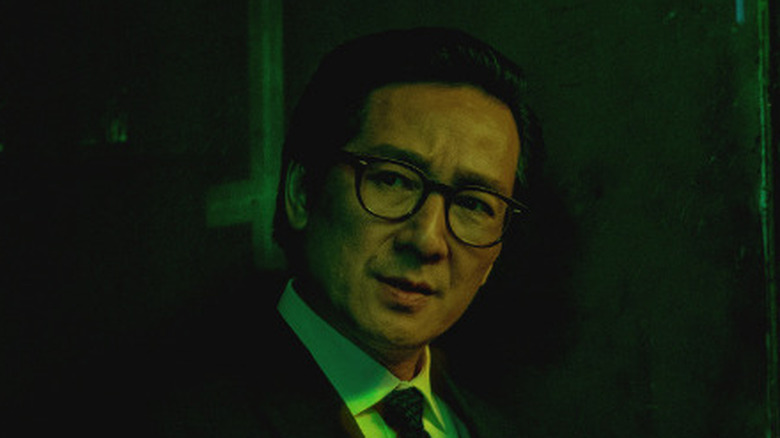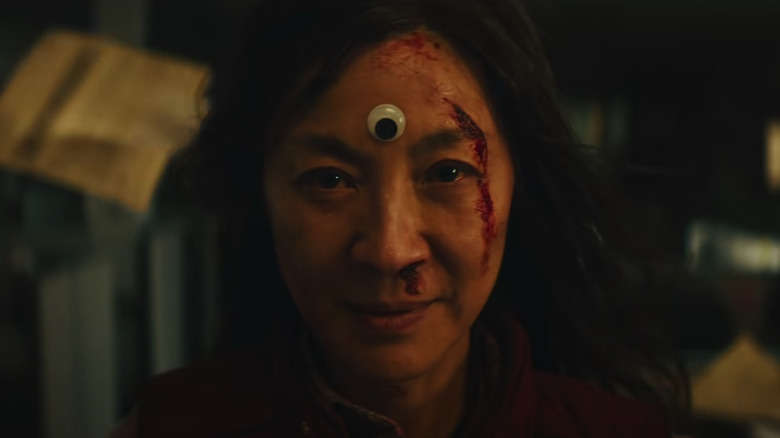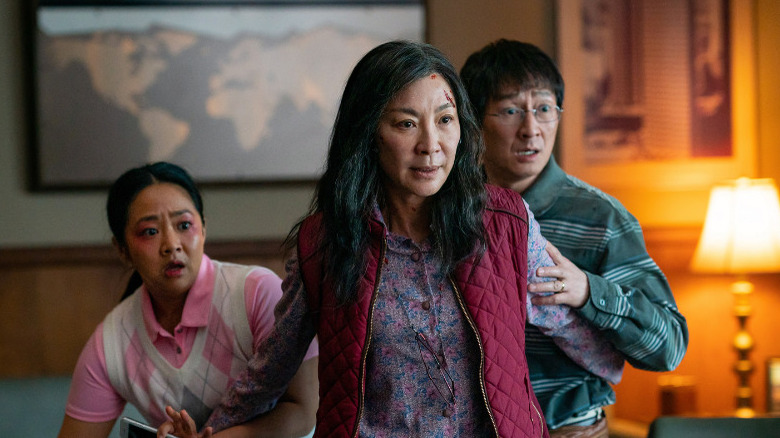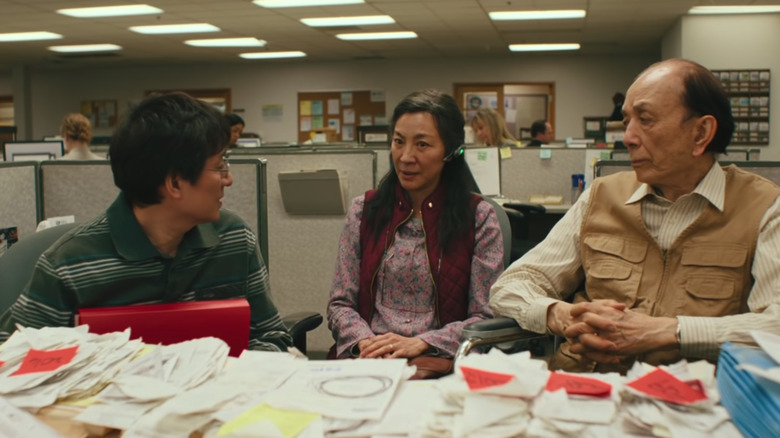The Ending Of Everything Everywhere All At Once Explained
"Everything Everywhere All at Once" is a bizarre and fascinating sci-fi action-comedy that offers so much to talk about. Michelle Yeoh portrays Evelyn Wang, a seemingly unremarkable woman who becomes the key to ending a conflict that is raging across the infinite multiverse. Evelyn's journey is joke-dense, action-packed, and rich with emotional pathos, all executed with a unique sense of style and outstanding technical precision by filmmakers Dan Kwan and Daniel Scheinert (collectively credited under the name Daniels). "Everything Everywhere All at Once" is a certified critical smash and one of the first absolute must-see movies of 2022, so if you're reading this, hopefully you've already given it a whirl and are just looking to dig deeper into the cinematic smorgasbord you've just witnessed.
The finale of "Everything Everywhere All at Once" takes place in multiple universes simultaneously, and we'll have to do a fair amount of verse-jumping ourselves to cover all of the material ahead of us. So put your shoes on the wrong feet, chew a whole tube of chapstick, or do whatever other crazy thing you have to do to get a green light on your headset and let's get going.
If what we just said doesn't make any sense to you, prepare for some major spoilers.
Verse-jumping and the Alphaverse
There are an infinite number of universes in the multiverse. For every event that has multiple possible outcomes, either by decision or random chance, a new universe is born. One of these outcomes results in the Alphaverse, the first universe to successfully make contact with the others. The residents of the Alphaverse develop the technology to map an individual's life path, showing every possible outcome of every decision they ever made. This also allows them to project their consciousness into the bodies of their counterparts in other universes, and to acquire the memories, skills, and emotions of alternate versions of themselves. This is called "verse-jumping."
As demonstrated by Alpha-Waymond in the film, verse-jumping requires that a person (wearing the proper headwear from the Alphaverse) perform some bizarre, improbable action, which creates a sort of multiversal slingshot effect that propels one's consciousness across their life map in the opposite direction. The more divergent variant of oneself a person needs to access, the weirder thing they'll have to do to connect with it. For instance, in order for the Evelyn who's sitting across from Deidre in the IRS office to split her consciousness with the alternate Evelyn who chose to go to the janitor's closet instead, she only needs to put her shoes on the wrong feet and concentrate. In order to access the skills of an Evelyn who became a martial artist and film star, she needs to earnestly profess her love to a woman who's trying to kill her.
Becoming an omniversal being
By the end of "Part I: Everything," we've learned that Jobu Tupaki, the omniversal being who Evelyn has been recruited to defeat, is the Alphaverse counterpart to her daughter Joy (Stephanie Hsu). Jobu was created when Alpha-Evelyn subjected Alpha-Joy to rigorous verse-jumping experiments. In the words of her father Alpha-Waymond (Ke Huy Quan), splitting one's consciousness between multiple alternate versions of oneself is like putting a crack in a clay pot. With proper training, the cracks can be patched up, but if it cracks too many times it'll shatter beyond repair.
Alpha-Joy has become unstuck from her reality and gained the ability to become any and all versions of Joy at will. This gives her the reality-bending powers of a living Looney Tunes character, and the madness to match. Seeing the full magnitude and absurdity of the infinite multiverse makes life seem utterly meaningless. She starts a pan-dimensional cult of nihilists and deals out death to anyone who gets on her nerves, in any reality. That includes her mother and thousands of other Evelyns across the multiverse.
Alpha-Waymond recruits the worst Evelyn in the multiverse (the version of Evelyn we follow throughout the film) to fight Jobu Tupaki because he believes that her multitude of unfulfilled life paths make her uniquely suited to advanced verse-jumping. In his words, "[she's] capable of anything, because [she's] so bad at everything." Alpha-Waymond is right — Evelyn takes to verse-jumping very quickly and in a matter of hours she ascends to Jobu's level of consciousness, occupying all of her possible lives at once.
Evelyn vs. everybody
Most of the action of "Everything Everywhere All at Once" takes place in the "IRS Universe," the one in which Evelyn's meeting with IRS agent Deirdre (Jamie Lee Curtis) is interrupted by pan-dimensional kung-fu hijinks. Here, the Worst Evelyn is given the tools and basic training to connect with the Evelyns of other worlds, and told that she must confront the worlds-destroying Jobu Tupaki.
Alpha-Waymond tells her that her mission is to counterbalance Jobu's evil with good, but his boss, Alpha-Gong Gong (James Hong), isn't as confident in her potential. He orders her to kill Joy — her own daughter — so that Jobu will no longer be a threat to this particular universe. Evelyn refuses, insisting that there must be another way to rid her daughter of Jobu's influence. This leads Alpha-Gong Gong to call for reinforcements, and Evelyn ends up fighting Jobu, Jobu's cultists, and the Alphaverse resistance.
Her only ally is Alpha-Waymond, who occasionally jumps into IRS-Waymond's body to help but is eventually killed in his own universe by Jobu. This leaves Evelyn with only her own Waymond by her side, and she views him as a weak, useless man-child. Rather than hang her hopes on winning the battle and saving her daughter in the IRS Universe, Evelyn deliberately pushes her mind beyond its shattering point, verse-jumping to a dozen worlds at once and becoming unstuck in the multiverse, just like Jobu.
Evelyn's many lives
Evelyn's multiversal overload marks the end of Part I and takes us into "Part II: Everywhere," so named because our Evelyn's consciousness is now bouncing between a number of universes. While it's easiest to think of IRS Evelyn as the "real Evelyn" that we're following for the rest of the film, that's not really the case. From here on out, there's really just one Evelyn, a single mind shared across an increasing number of possible lives until she eventually achieves omniversal consciousness. We see a fair sampling of the universes that she's inhabiting, but for ease of discussion, let's label the most important ones:
The IRS Universe: The spine of the story, where Alpha-Waymond interrupts Evelyn's scheduled meeting with the IRS and recruits her into the multiversal war. This Evelyn's body is unconscious for most of Part II.
The Party Universe: This is what would have happened if Alpha-Waymond had never shown up in the IRS Universe. Waymond convinces Deirdre to give him and Evelyn until 6pm to refile their taxes, and they go home to prepare for the laundromat's Chinese New Year party.
The Movie Star Universe: Here, a young Evelyn refused Waymond's proposal to run off to America together, and she instead became a martial artist and international movie star. This is the life Evelyn most prefers, and it represents the level of success she might have achieved if she hadn't married her childhood sweetheart.
The Hot Dog Fingers Universe: All human beings have big, limp hot dogs for fingers, and Evelyn and Deirdre are a couple.
The everything bagel
As an experiment, Jobu Tupaki has used her power over reality to create something impossible — an "everything" bagel, topped not just with poppy and sesame seeds but every experience and concept she can think of. The sum total of everything, it turns out, is nothing, an all-consuming black hole. The resistance of the Alphaverse believes that this is a doomsday weapon with which Jobu plans to destroy all of reality. But actually, Jobu is planning to use the bagel to end her own life. Her rampage across the multiverse has been in search of someone who can ascend to her plane of existence, understand what she's going through, and maybe talk her out of destroying herself.
However, once Evelyn becomes able to jump effortlessly between all realities alongside her daughter, she takes to Jobu's nihilistic philosophy all too well. Across the multiverse, Evelyn starts acting out of cruel, selfish impulse, hurting those around her, because why not? If there's an infinite number of universes in which every imaginable outcome is happening simultaneously, then there's no meaning behind any of it. Nothing matters.
In interviews, Dan Kwan and Daniel Sheinert have equated the multiverse of their film to the experience of modern life on the Internet. People who have grown up in the digital age have a totally different sense of scale to their world than the generations that came before them, which has created a vast cultural divide. Joy/Jobu is a grown-up millennial who's plugged into an overwhelming feed of constant, often contradictory information, has measured her own value, impact, and suffering against the sum total of existence, and can no longer bear it. She shares this experience with her mother, hoping they can find some meaning in it together. And at least at first, they cannot.
Evelyn gives in to the bagel
After Jobu shows Evelyn the everything bagel, Evelyn has a dead-eyed nihilistic meltdown that spans multiple universes. In the Party Universe, Evelyn doesn't bother to show up for her rescheduled meeting with Deirdre. Since the business is already on lien to the IRS, Deirdre shows up to the laundromat's Chinese New Year party with a police escort with the intention of repossessing the property. When Evelyn smashes the front window of the laundromat with a baseball bat, it's not just an act of defiance against Deirdre but an an expression of her loathing for the laundromat and what it represents to her. She's seen the life she could have lived if she'd never come to this place — in fact, she's living it now, in another universe — and she no longer has any reason not to act on her resentment. She could go to jail and her family could lose their home, but it doesn't matter, because nothing matters. There are an infinite number of Wang families. Who cares what happens to this one?
Across the multiverse, Evelyn stops caring about the consequences of her actions or their effect on others. In the Hot Dog Fingers Universe, she coldly dismisses Deirdre, who can't understand why her partner has suddenly turned away from her. In the Movie Star Universe, Evelyn tries to seduce Waymond's mature, melancholic counterpart while cruelly teasing him about the life they could have lived together, and in the IRS Universe, Evelyn wakes up and stabs Waymond in the gut with a shard of glass, just because she can.
She then shuts out all of these universes to live as a rock on an Earth where life never developed, because that means she won't have to think about any of this.
Waymond's philosophy
Throughout the entire film, Evelyn has been cruel and dismissive towards Waymond. She sees Waymond as a naive, weak-willed pushover, and blames him for her unfulfilling life at the laundromat. While we see that Evelyn could have achieved great things without Waymond in her life, we also see the positive results of Waymond's philosophy of unconditional kindness throughout the entire film, and each time, Evelyn barely notices. He diffuses a conflict with a dissatisfied customer at the laundromat by dancing with him, and his tray of homemade cookies convinces Deirdre to grant an extension on their taxes. Even when he draws up divorce paperwork, he does it in the hope that this will alert Evelyn to the his unhappiness and that they'll be able to turn their marriage around.
It's only after Evelyn has totally given up on life that she appreciates the power of Waymond's kindness. In the IRS Universe, he refuses to give up on Evelyn even after she's stabbed him — all he wants is for everyone to stop fighting so Evelyn can help their daughter. In the Party Universe, Waymond once again appeals to Deirdre's sympathies and convinces her to give Evelyn one more week to finish the paperwork. And, in the Movie Star Universe, the more put-together Waymond expresses his philosophy with a clarity that the other versions can't quite manage — His kindness isn't naive, it's a deliberate strategy for living. It's how he fights for a better life and a better world, how he gives meaning to his small existence.
Evelyn has never reached this level of understanding with the Waymond she married, but now she can look back on their life together and see the beautiful parts of their relationship more clearly.
Deirdre redefines love for Evelyn
At around the same time that Evelyn is reassessing her relationship with Waymond, she's approached by Deirdre in the Party Universe. Waymond has told Deirdre of his and Evelyn's pending divorce, and Deirdre, a divorcée herself, sympathizes with Evelyn. But Evelyn knows that Deirdre isn't unlovable because, in one far-off universe, she loves Deirdre and the two of them have built a life together. She comforts Deirdre, and the two of them begin a friendship.
It's probably not a coincidence that, immediately after this reflection on her relationship with Deirdre in the Hot Dog Fingers Universe, Evelyn has an epiphany about how she's been reacting to her daughter's sexuality. Joy has been dating her girlfriend Becky (Tallie Medel) for three years, but Evelyn remains, at best, begrudgingly tolerant of the relationship. Evelyn even attempts to blame Joy's attraction to women on the malevolent influence of Jobu Tupaki, betraying that Evelyn has seen homosexuality as an affliction rather than a natural part of her daughter's life. At the start of the film, Evelyn hurts Joy by introducing Becky to Gong Gong as Joy's "good friend." Now, after accepting her own love for Deirdre, Evelyn marches up to Gong Gong and corrects herself, praising Becky as a patient, loving partner who takes good care of her daughter.
This is also an important moment in Evelyn's relationship to Gong Gong, whose disapproval has been asphyxiating her for decades. Evelyn has been passing on that trauma to her child, but now she's starting to turn that around.
Evelyn changes how she fights
When Jobu Tupaki summons the everything bagel to the IRS Universe, Evelyn has only a matter of time to stop her from diving into it and letting it destroy her. Apart from Waymond, everyone present wants Jobu to go through with it — Deirdre and the cultists are at her command, and Alpha-Gong Gong and his resistance cell just want to be rid of her. Evelyn is now an omniversal being, with all the same reality-bending powers as Jobu, and she could easily destroy the entire army that stands between her and her daughter. But instead, she adopts Waymond's strategy of fighting with kindness.
When we first see Jobu take apart a trio of police officers earlier in the film, it's hard to make total sense out of how her powers work. She's basically operating under cartoon rules, able to do anything so long as it amuses her. Once Evelyn acquires this same power, we gain a slightly better understanding of it. Each time she confronts an Alphaverse soldier, she peers into the web of their alternate lives and then uses that knowledge to make changes to reality. Where Jobu would make changes that were destructive or deadly, Evelyn does something that makes her opponents happy, like fixing their bad neck or replacing their weapon with a bottle of their late wife's perfume.
Granted, this is still cartoon rules, but the tone of "Everything Everywhere All at Once" does not demand that it all make literal sense. What's important is that Evelyn uses the absurdity and chaos of the multiverse to create joy rather than pain.
Nothing matters, and that's okay
Even after "fighting" a dozen people to prevent Jobu from diving into the everything bagel in the IRS Universe and finally stepping up in support of Joy and her girlfriend in the Party Universe, the divide between Evelyn and her daughter is not entirely mended. Joy doesn't feel as if she can trust that things will really get better with her mother in the long run. Their relationship is punctuated by intense moments of drama that cause Joy a great deal of stress and pain and she still thinks she'd be better off if they went their separate ways. In the Party Universe, Joy plans to drive away from the laundromat and never look back. In the IRS Universe, Jobu stands at edge of the everything bagel and is ready to fall into it.
Joy has a crushing fear of inadequacy, not just that she'll never be enough for her mother but that she could never matter at all, that nothing does. In a final effort to assuage that fear, Evelyn confesses that, yes, the multiverse is unfathomably large, but out of the limitless possibilities of existence, what she wants most is to be with her daughter. It doesn't matter that there are other, better versions of each of them out there. The lives they're living right now are just as insignificant, and therefore just as important, as any of the others.
"Everything Everywhere All at Once" doesn't reject nihilism as a philosophy. Rather, it promotes a more optimistic, humanist nihilism. Instead of "nothing matters, so why bother?" it says "Nothing matters, unless you decide that it does."
Evelyn makes the most of her 'worst' life
"Part III: All at Once" is a brief coda that takes place entirely in the Party Universe. Evelyn is a changed woman, now more affectionate towards Waymond, more accepting of Joy and Becky, and sporting a more positive outlook on life. Evelyn's change in attitude is the only material impact that the science fiction elements of the story have had upon the Party Universe — even Joy never directly references her other lives in dialogue in any scenes set in this universe. If a viewer is so inclined, they might be able to contend that the entire adventure in the multiverse has occurred only in Evelyn's head, and that the Party Universe is the only "real" universe in the film. (This type of viewer is called a "party pooper.")
As Evelyn sits down with her family for their make-up meeting with Deirdre, we discover that she is still hearing voices from the other universes in her head. Assuming that these voices are real (and we do, party pooper), this suggests that Evelyn still exists in all other universes at once (as is implied by the chapter title) but has chosen to remain present in this world rather than obsess over the roads not taken. It's still sometimes a challenge to remain in the moment, especially when an IRS agent is lecturing her about the state of her paperwork, but she no longer lives in regret. She's at peace with the live she's lived, the family she's built, and the possibilities that lay in her future, not just in her past.

